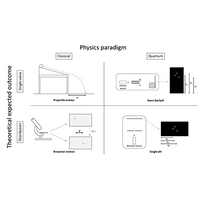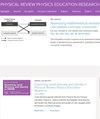Context affects student thinking about sources of uncertainty in classical and quantum mechanics
IF 3.6
2区 教育学
Q1 EDUCATION & EDUCATIONAL RESEARCH
Physical Review Physics Education Research
Pub Date : 2023-11-15
DOI:10.1103/physrevphyseducres.19.020157
引用次数: 3
Abstract
Measurement uncertainty is an important topic in the undergraduate laboratory curriculum. Previous research on student thinking about experimental measurement uncertainty has focused primarily on introductory-level students’ procedural reasoning about data collection and interpretation. In this paper, we extended this prior work to study upper-level students’ thinking about sources of measurement uncertainty across experimental contexts, with a particular focus on classical and quantum mechanics contexts. We developed a survey to probe students’ thinking in the generic question “What comes to mind when you think about measurement uncertainty in [classical/quantum] mechanics?” as well as in a range of specific experimental scenarios and interpreted student responses through the lens of availability and accessibility of knowledge pieces. We found that limitations of the experimental setup were most accessible to students in classical mechanics while principles of the underlying physics theory were most accessible to students in quantum mechanics, even in a context in which this theory was not relevant. We recommend that future research probe which sources of uncertainty experts believe are relevant in which contexts and how instruction in both classical and quantum contexts can help students draw on appropriate sources of uncertainty in classical and quantum experiments.

背景影响学生对经典力学和量子力学中不确定性来源的思考
测量不确定度是本科实验课程中的一个重要内容。以往关于学生对实验测量不确定度的思考的研究主要集中在初级水平学生对数据收集和解释的程序性推理上。在本文中,我们扩展了之前的工作,研究高年级学生在实验背景下对测量不确定性来源的思考,特别关注经典和量子力学背景。我们开展了一项调查,以探索学生对一般问题的思考,“当你想到[经典/量子]力学中的测量不确定性时,你会想到什么?”以及一系列具体的实验场景,并通过知识片段的可用性和可及性来解释学生的反应。我们发现,在经典力学中,学生最容易理解实验设置的局限性,而在量子力学中,学生最容易理解基础物理理论的原理,即使在与该理论无关的背景下也是如此。我们建议未来的研究探索专家认为哪些不确定性来源在哪些背景下是相关的,以及经典和量子背景下的教学如何帮助学生在经典和量子实验中利用适当的不确定性来源。
本文章由计算机程序翻译,如有差异,请以英文原文为准。
求助全文
约1分钟内获得全文
求助全文
来源期刊

Physical Review Physics Education Research
Social Sciences-Education
CiteScore
5.70
自引率
41.90%
发文量
84
审稿时长
32 weeks
期刊介绍:
PRPER covers all educational levels, from elementary through graduate education. All topics in experimental and theoretical physics education research are accepted, including, but not limited to:
Educational policy
Instructional strategies, and materials development
Research methodology
Epistemology, attitudes, and beliefs
Learning environment
Scientific reasoning and problem solving
Diversity and inclusion
Learning theory
Student participation
Faculty and teacher professional development
 求助内容:
求助内容: 应助结果提醒方式:
应助结果提醒方式:


